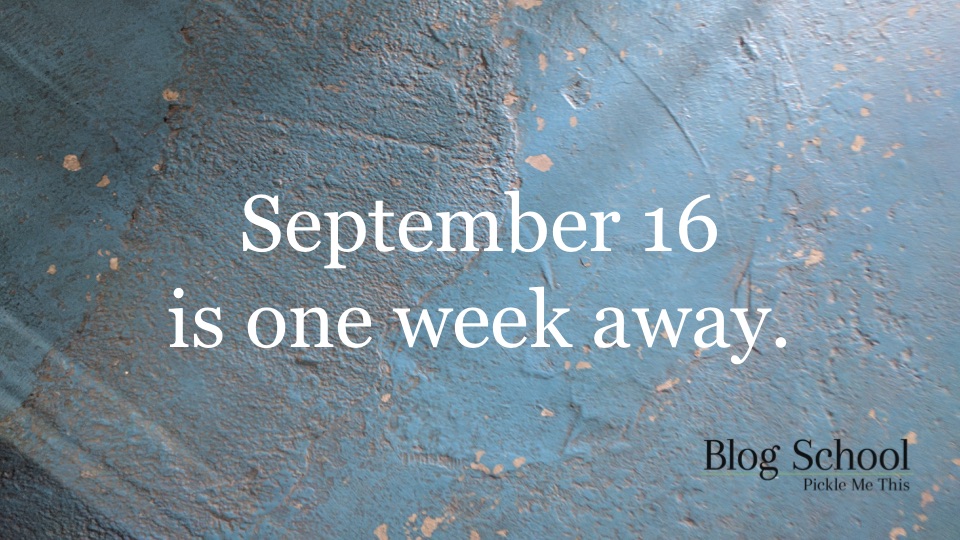September 9, 2019
Gleanings
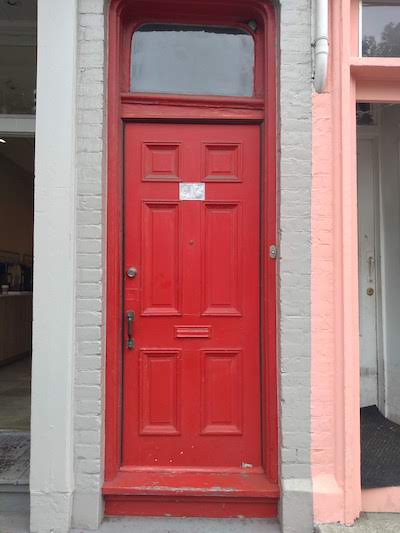
- Your responsibility is what you can control.
- So, if I’m getting this correct, the universe is telling me to be generous
- Blogging about my teaching prods me to reflect on it rather than just get through it and move on; I think it has made me a better teacher as a result.
- One can’t think too much about the idea of a dozen almost naked bodies sharing a large, be it chlorinated, bath tub.
- Let’s generously share our history, our knowledge and experiences, the lessons we’ve learned and our hopes for their futures.
- The main thing I learned about baking this summer is that many things are cake.
September 16 is one week away, which means one more week for you to receive 15% savings on Blog School: Pickle Me This with discount code “early bird”. Find out more here…
September 6, 2019
Book News: Waiting for a Star to Fall
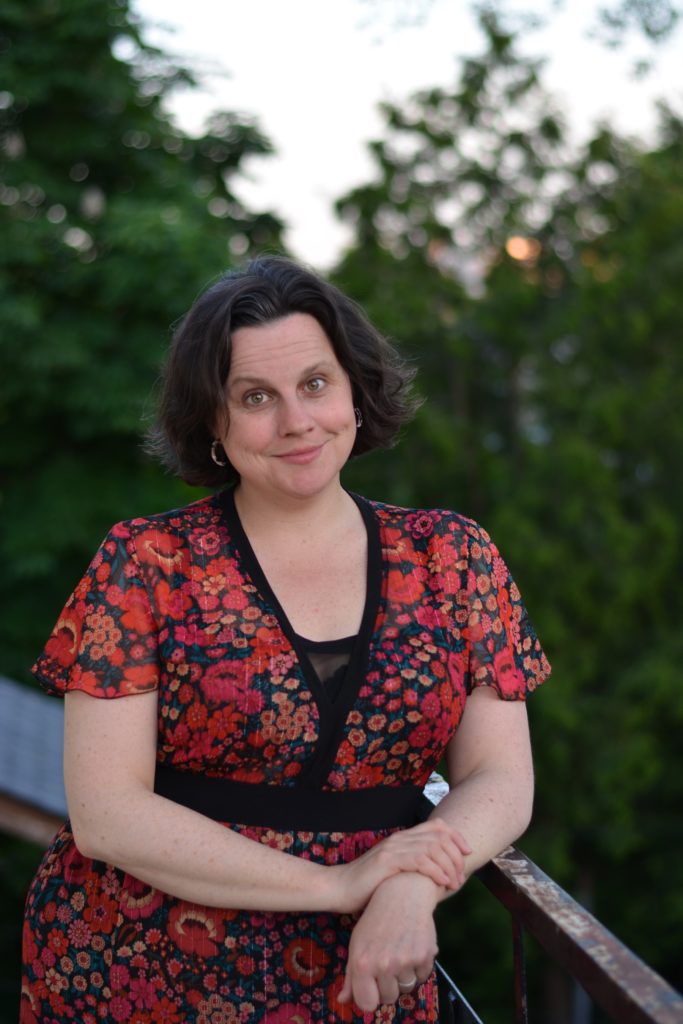
It is with more joy than you can imagine that I write you with the news that my second novel, Waiting For a Star to Fall, will be published next summer in Canada and the US by Doubleday Canada.
For fans of Joanne Ramos and Zoe Whittall, and Emily Giffin, a sensationally gripping and resonant new novel about a young woman caught in the midst of a political scandal.
When political superstar Derek Murdoch is brought down by decade-old allegations of sexual misconduct, his on-again/off-again girlfriend Brooke is left to process the situation. Derek’s reputation is being dragged through the mud because of his propensity for dating much-younger women who work for him–but Brooke knows the situation is more complicated than that. Never mind that she was once his young employee too. . . .
As the public makes up its mind about Derek, Brooke is forced to re-examine the story of her relationship with him–a position made even more complicated by the fact that she and Derek are now estranged after a heartbreaking betrayal. She’s shared the reason of their breakup with no one–but now she fears it may rise to the surface.
Torn from the headlines, Waiting for a Star to Fall is a novel for the #MeToo era, an absorbing story that examines the complex dynamics of politics–and sexual politics–and questions the stories we tell about people in the public eye, and the myth-making of men.
Two years ago (or thereabouts), my friend May bought me a bought that said NOVELIST on it, a title I’d always felt strange assuming, because it seemed kind of presumptuous. even if I had just published my first novel. (Maybe it was all just a fluke?)
I’ve always been a bit wary of this idea that it matters what you call yourself at all, because it’s what you do that counts, not who you are. As a person who writes a lot, I have a certain impatience listening to writers try to justify not writing, and how you’re still a writer anyway when you don’t, blah blah blah. What if instead of having this conversation, I would think, you just sat down and actually wrote something?
Now I understand where this kind of sentiment comes from, the ways in which many women have trouble assuming authority or owning their experience, undermining themselves, the same way that Shirley Jackson was just a housewife. But it’s still putting the cart before the horse, I think, to imagine that learning to call one’s self a writer or “novelist” is even remotely the answer to the question of how to get to be a published author. (I read an old, old pre-Pickle blog post recently in which I worried that I’d spent far more time thinking about being a writer than actually writing. I was definitely on to something there…)
But even still, over the past two and a half years—as my first novel came into the world, and then I wrote two more books, and faced rejection and uncertainty about my future as a writer at all (let alone a “novelist”)—that mug served me a kind of talisman. That I was also doing the work of writing is fundamental to this story, but I came to understand how important it can be to own this little piece of legitimacy, even if it’s one that’s carved into a mug. But it mattered. It helped me keep going—and possibly keeping going is more vital to success than anything else in the world, that which can be written on a mug and otherwise.
And the other thing that helped me keep going was, as always, my blog, particularly this year, which I entered without a real sense of anything to look forward to creatively, and so I decided to delve back into the DIY blogging ethos and make those things to look forward to myself. After years of talking about creating an online blogging course, I decided to go for it—Blog School launches September 16. I also dreamed Briny Books into being, which turned out to be an altogether successful project, a triumph, even—the second round of seasonal selections will be coming your way in October.
And then to have a book deal, with the publisher/editor of my dreams, even, on top of that? More goodness than a person could ever ask for, really, and all of this a reminder that when all seems lost and hopeless, getting off the floor where you’ve been lying curled up in the fetal position is probably the best thing to do eventually.
Who knew?
September 4, 2019
Trick Mirror, by Jia Tolentino
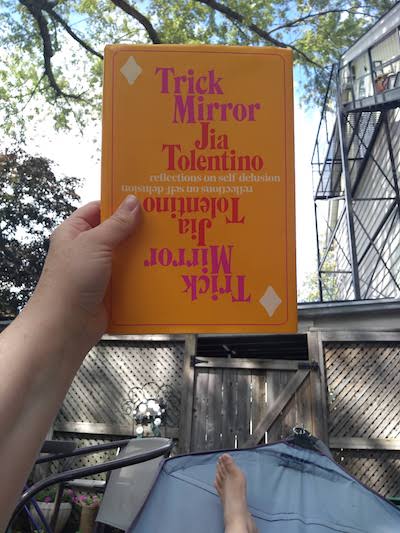
I don’t think I’ll ever be ready to write a post about Jia Tolentino’s essay collection Trick Mirror, but I was set to do some preparatory work before I did. Because these aren’t essays that I’m finished with yet, or completely understand properly. These aren’t blog posts or hot takes that have been churned into book—these are essays 40-50 pages long, and one concludes with, “I wish I had known…that the story didn’t need to be clean, and it didn’t need to be satisfying; that, in fact, it would never be clean or satisfying, and once I realized that, I would be able to see what was true.”
I am still trying to puzzle my way through her incredible “The Cult of the Difficult Women,” which explores the way that Daring Girls pop-feminism becomes weaponized for anti-feminist purposes—”But when the case for a woman’s worth is built partly on the unfairness of what’s levelled at her, things get slippery…” My OOF moment in “Pure Heroines,” about literary girlhoods and the limits of literary womanhood, rich for me with familiar points of reference, when she writes, “You’ll have noticed—surely, you’ll have noticed, though I don’t want to be too generous—that all the characters in this essay are white and straight.”
These essays are trickier than most others I’ve ever encountered, pulling away and pushing on just when you think they’re settled, and resisting tidiness, easiness. So that the reader comes away with their mind still spinning, work to be done. Tolentino offers no conclusions, resolutions. She is not going to do the work for you.
I read a review recently that focussed on the bleakness and despair in these essays, works that make connections between the Fyre Festival and the 2008 financial crisis (and GirlBosses) and a culture of scamming: “There are fewer and fewer options for a person to survive in this ecosystem in a thoroughly defensible way.”
But bleakness and despair was not my takeaway from Trick Mirror, the title a statement on the nature of true and reality, delusion and self-delusion. How do you know when what you see, or what you are, is real? And just when you think you’ve got it settled, it’s gone and changed again. And bleakness and despair was not my takeaway because it took me almost two weeks to finally buy this book, which was sold out at every bookstore I showed up at. And if the demand is so high for these rich and erudite works, essays that aren’t going to fucking let you get away with it or get away with anything… The way I feel every time I see the way that someone (usually Ali Smith) has made something so artful for these torrid time we’re living in—oddly hopeful, even. Not all yet has been lost.
September 3, 2019
Gleanings

- What would happen if we claimed our expertise, and if we claimed our power? What is it that you know? What happens when you share that joyfully with the world? How can we be great and kind and powerful and mindful and joyful and decent?
- Nature is astounding. Human nature is confounding.
- There’s so much to see and discover in her world of trees…
- One day somebody is going to be sorting through my debris and wondering what some of it meant.
- This is how it was in The Long Ago Days of The First Radishes.
- It helps to be alone for a huge chunk of the day, in a silent cabin, on the edge of the ocean.
- So today, I’m here to tell you: INHABIT YOUR NATURAL STATE.
- I’m grateful daily that I can work wherever I find myself.
- I’ve been on some amazing journeys to far off places (from my armchair) so far this year.
- But any day, any weather is a good day and fine and acceptable weather for a silent book club meeting.
- I can attest to the value and impact of the Shine Theory.
- There’s still a place, a quiet place, for the books that don’t aspire to Big.
- If I could let go of the idea that I should know, I might actually learn a great deal.
Do you like reading good things online and want to make sure you don’t miss a “Gleanings” post? Then sign up to receive “Gleanings” delivered to your inbox each week(ish). And if you’ve read something excellent that you think we ought to check out, share the link in a comment below.
August 27, 2019
The Need, by Helen Phillips
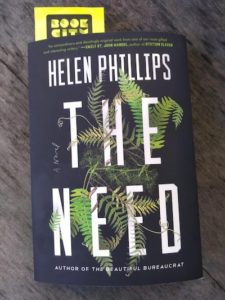
“She and David had a running joke about how they both feared their kids at night the same way that, as children, they’d feared monsters under the bed. Beasts that would rise up from the side of your bed, seize you with sharp nails and demand things of you.”
I’ve been hearing things in the night for my entire life, the sound of footsteps, or maybe the house is just settling, or the sound of the wind outside. What was that? But it’s only since I’ve become a parent that I actually see things, that I awake from sleep with the uncanny feeling of someone standing over me, and I open my eyes and there they are, my worst fears confirmed. (And the fear, I mean, is in addition to the practical matters, that these nighttime visits are generally a harbinger of the fact that I’ll have to clean up puke.)
In her novel, The Need, Helen Phillips zeroes right on this kind of anxiety (albeit regarding an even more sinister nighttime interloper) in the book’s first three sentences: “She crouched in front of the mirror in the dark, clinging to them. The baby in her right arm, the child in her left./ There were footsteps in the other room…”
Molly’s husband, a musician, is away on tour, and she’s just relieved the babysitter. She’s the primary breadwinner in the family, a paleobotonist who works at a site that’s turning up baffling specimens: plant fossils that don’t seem to related to any other living thing on earth, an Coca Cola bottle whose logo slants backward, a Bible that addresses God as “her” and “she.”
Something is askew, but also everything is askew, because Molly has a baby and a toddler, which means she hasn’t had a proper night’s sleep in years, and her hours are consumed by her children’s near insatiable needs and demands upon her. So there is something metaphorical about the otherworldliness Molly is experiencing at work, and we’re to doubt her perceptions—are there footsteps at all?
But the footsteps are real, and the stranger in the other room wearing a deer mask has a bizarre awareness of Molly’s family’s life and their rhythms—and the reality behind this situation turns out to be nothing like what you’ve expected, and it continues to be questionable how much the reader can understand this as “reality” at all.
This is a novel in which everything is true and possible, and nothing is; where a child’s birth and existence contains the possibility of their death; where doubleness is a solution and a nightmare; where the cessation of what seems unbearable is unsurvivable; and where the figurative and literal do battle, as do the fantastic and realistic; and ambivalence has its every nook, cranny and sub-basement explored.
This novel starts off terrifying, and the way Phillips sustains that suspense (moving back and forth between two timelines, plot, twists and pacing) is astoundingly well done. Though I will admit that by the time my biggest questions had been answered (which only invited plenty more questions still, of course) I was less enveloped by the plot—though probably for the best, if we’re thinking about my blood pressure.
All this with a novel that articulates the minutiae of daily life with children like nothing I’ve ever read before, a twisted and brilliant version of Rachel Cusk’s A Life’s Work.
And then the ending—so dark and banal at once. So subtle that you might even miss it, but the subtlety—of the violence, the brutality, that you could miss it—is the point. The Need is a fast read, but it’s haunting.
August 23, 2019
The Opposite of Scrolling
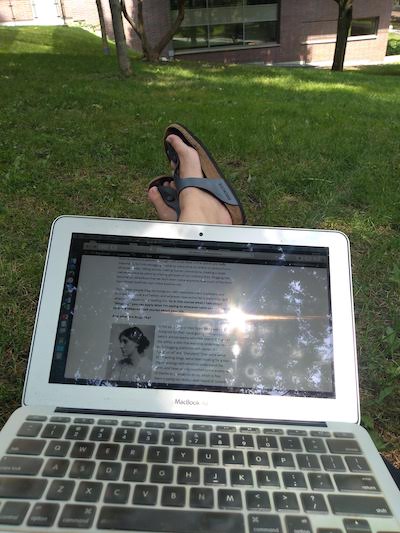
True confession: I don’t have that experience that so many people describe of social media, how scrolling through your feed just makes you feel like your own experience is inadequate, because you don’t go on fancy vacations and have never had the means to hire a decorator, and have never once had your photo taken in a field of sunflowers.
And yes indeed, part of the reason I don’t feel those feelings of inadequacy is because I have a pretty nice life, with health and happiness—I am also RIDICULOUSLY good looking, but that’s another story*—even if I’ve never had the means to hire a decorator and while we once did indeed visit a lavender field, all the plants had been stunted by a late season frost.
(I suspect it also helps that I tend to follow real humans whose photos were not all professionally shot on a mountain top during golden hour. #SponsoredPost #Partnership #SoBlessed)
But that’s only part of it. A huge reason why I tend to have a positive experience on social media is because, like many others, I don’t use these platforms passively, but instead I engage with them in an active way. I post photos, tell stories, reach out to friends, solicit feedback, share jokes, and heartaches, frustrations, insights and ideas. Each of my posts, no matter the platform, a kind of message in a bottle—except that it’s different from a bottle for the likelihood I’m going to get some kind of response.
And it’s that response I’m looking for, actually, every time I log in to Twitter, Facebook or Instagram—the first thing I do is check my notifications. (Not unrelated: turning OFF all notification alerts, so that I ACTIVELY have to seek them out, has improved my quality of life. So does not having Twitter or Facebook on my phone.)
So that what I get from social media (when I seek it out. Being deliberate is important) is actually community, genuine connections, friendship and support. And yes, I also want to see photos of your vacation, but it’s easier to not feel depressed when you’re in Hawaii and I’m in Toronto and it’s February when I don’t feel like I’m utterly alone in the world and also when I can scroll back and see a photo of the pretty mug of hot chocolate I posted yesterday. (Instagram is also about the beauty of small things and quiet moments. This matters to me a lot.)
I first started thinking about this the other week while I was listening to this radio interview with Mark Kingwell (“Canadian philosopher Mark Kingwell examines the idea of boredom and our digital devices”) about the dangers of passive scrolling. Kingwell says, “We’re not participants; we’re lab rats and the advertisers are gathering our data, and they’re feeding it back to us in forms like triangulation of desire. They are treating us as resources and they don’t care about you as an individual. They care about your data and about your preferences. So yes I do think that all kind of feeds back.”
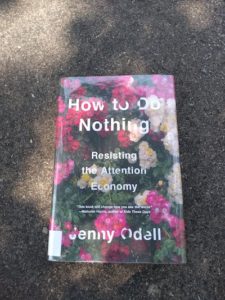
But when you do participate, you complicate things with your humanness. (When you participate by blogging on your own website, you complicate things even more, and challenge the idea that the web is a corporate space wholly navigable by algorithm, and this is no small thing!) The opposite of passive is active, and the opposite of scrolling is creation. Yes, for some the answer might be to disconnect from social media and online life altogether, but for most of us something more nuanced is required. (Jenny Odell writes about this splendidly in How to Do Nothing: Resisting the Attention Economy.) The answer is first to be more conscious of how we use our attention online. The second answer to aspire to have a rich and engaged life off the internet. And the third is to be an active participant in online culture. Stop scrolling, and make stuff.
Because you’re Somebody. In fact, we all are.
And even better? I really believe that being an active participant in online culture can improve other parts of your experience IRL. (This is what I mean when, in my blogging course, I talk about how having a blog can make your life richer.) Yes, much of online experience is aspirational, but I think it’s weird that we wholly dismiss aspiration as a bad thing. How can it be, really, if these aspirations are ones it’s possible to realize?
There are so many books I’ve read, and places I’ve visited, cakes I’ve baked, and things I have seen that have been so incredible to experience—things I never would have known about if I hadn’t seen them on Instagram first.
I also remember in the months after my first child was born, when I was (though this was only evident to me in retrospect) deeply unhappy and the online images I was presented with of “perfect motherhood” didn’t actually make me feel less-than, but made me better, that a life beyond “lying on the floor half-naked and weeping” was actually possible. It was important for me to believe that it was, that one day I’d get dressed again.
So many times, the things I’ve seen online have kicked my ass (in the best way) and forced me to get out there in the world.
Because the world is interesting, but also because, otherwise I’d have nothing to blog about, to write about, to post about. And yes, there was that vastly overpriced soft-serve place near my house whose ice cream cones looked fabulous in my Insta-feed, but didn’t taste any better than an ice cream a quarter of the price that came off a truck—but that place actually went out of business. And it’s really not all as superficial as that.
What would happen if you went out of your way to find a flower to photograph tomorrow?
“*I am also RIDICULOUSLY good looking, but that’s another story” is my favourite joke, by the way. Because being the opposite of self-deprecating when you’re a perfectly normal looking middle-aged woman is as subversive as it gets, actually. Every time I utter this sentence, the world shifts a little bit. ESPECIALLY since I really do like the way I look, and remember why I do? Because of selfies, of course. Posting online: it really can be good for you.
August 22, 2019
Watermark, by Christy Ann Conlin
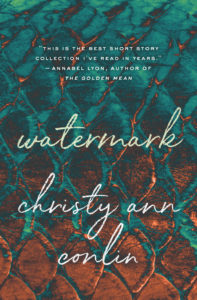
In order for a short story collection to really work for me these days, it’s got to be a book, which is not a popular opinion in short story circles, I realize. And while in other seasons of my life, I’ve had time for those collections that must be measured out (and I think I’ve even written blog posts in ode to them), right now I’m measuring my life in towers of books I’ve read, as compared to the even more colossal towers of ones I’ve got to get around to still—so I require momentum, some kind of arc, stories that complement each other and provide me with a very good reason to power through.
And Christy Ann Conlin’s latest book Watermark fits the bill exactly, which was why I was so happy to be devouring it last weekend. Most of the stories are set in Nova Scotia’s Annapolis Valley, and even the stories that aren’t are about characters who cannot become untethered from the place, no matter how they try. There are a few links between the stories, though they’re not completely overt. And also links to Conlin’s acclaimed first novel, Heave, which was published in 2002.
But primarily, this collection is drawn together by by characters who are witchy women, or supposed to be so. Women who are dangerous, wayward, and refusing to conform…and indeed a writer can cast her net wide in that area, and still come up with remarkable breadth, as Conlin does here.
Ragey mothers, rebellious daughters, reluctant wives, and furious sisters populate the stories in Watermark. My one criticism of the collection is a couple of stories with way too much expository dialogue. But apart from that, the book is terrific. The first story that stunned me was “Occlusion,” about a woman with a messy life undergoing an examination for lumps in her breasts—and it intermeshes with other storylines about still birth, infertility, friendship, sisterhood, rivalries, and the possibilities of a family curse. (What kind of thing is destiny?) I also loved “Back Fat,” about a boat, a bad marriage, and an old friend who sticks around like a bad smell or the devil on your shoulder. “Desire Lines” is about a woman whose father fashioned himself as a mystic and who grew up as part of his commune—until a terrible tragedy severed her from him forever. But for better or for worse? “Beyond All Things is the Sea” begins, “Birdie says to go tits to the wind./ And I am going tits to the wind.” A rollicking, jilting (in more than one sense of the word) story that takes place in a van that is a getaway car as Seraphina is driven away by her two best friends from what was nearly her wedding—and I think this was the launch point for Heave.
There is death and murder, and accidents that may not have been accidents, or maybe the moral of these stories is that there is no such thing as an accident at all. Instead, there is purpose, precision, and an incredible haunting darkness, all of which are the reasons why Watermark is such pleasure to read from cover to cover.
August 19, 2019
I Found an Egg Beater
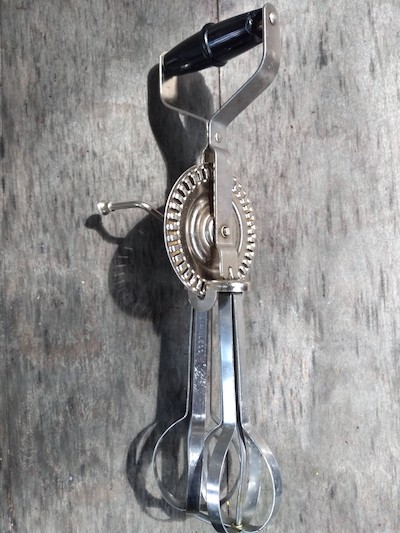
Of all the machines in a kitchen, the egg beater has always been my favourite, and while the electric version has its advantages (the beaters detach for optimum licking), it’s the manual (or “rotary”, like a phone dial, both rotating around an axis) that has long been an object of my fascination, even though I’d be wary of getting my tongue stuck in a thing like that. Probably I wasn’t, however, when I was a child.
But my children have never seen an egg beater, which a) explains some of the trouble they’ve had in swimming lessons and b) was confirmed to me when Iris and I were reading a book in which an egg beater featured, and Iris only shrugged. I’d had an electric egg beater once upon a time, but I got rid of it when I got my first stand mixer over ten years ago, and back then the children were not yet in existence.
And then we were at Value Village on Saturday, exploring kitchenware, which is one of my favourite things to do. And it had occurred to me that I like exploring kitchenware at Value Village just as much when I don’t discover any treasure as I do when the search yields a new Pyrex bowl or midcentury crockery (I am mad for midcentury crockery) because when I don’t find anything, it means I don’t have go about locating a place to put it in my very crowded kitchen.
But I found an egg beater, in fact there were two—in additional to so many cocktail utensil sets. There are too many cocktail utensil sets in the world, and also George Forman grills, but we’re not yet overrun with rotary egg beaters, so I chose the one that wasn’t rusty, even if there were pieces missing from the plastic handles on the other. (Why corrupt such a wonderful object with plastic anyway?)
Iris was overjoyed to recognize the object, and then everybody started fighting over who gets to turn the handle and make the wheel turn, and we hadn’t even paid for it at this point. But it is so satisfying, the whir of the blades, the smoothness of the motion, the perpetualness of it. How I use my own energy to turn the handle, which makes the big wheel spin, whose grooves connect with the two little gears atop the beaters, and what genius thought of such a perfect machine? (Willis Johnson, according to the BBC, in 1884.)
“It’s an amazing thing,” I told my kids. “It doesn’t use any energy, and you can even make a cake when the power’s gone out.”
And then Iris came up to me hours later, as though she’d been thinking about this throwaway comment. “How do you see when you’re baking in the dark?” she asked me. “When the lights are out.”
But how do we even turn the oven on at that point? (We have a gas oven. Perhaps it might work?) I imagine us making a soufflé by candlelight.
In 48 hours, we’ve used the egg beater twice, to whip egg-whites for the Sunday waffles, and Iris got to do that because Harriet was playing Nintendo. And then yesterday evening I was making muffins for the week’s lunches, and Harriet wanted a turn, and then the two of them started fighting because Harriet was going too fast and all the eggs were getting beaten, and it really is such a clever little gadget, no matter that it’s disrupted family harmony.
Better than a fidget spinner—I could run that thing all day.
August 15, 2019
Immediacy
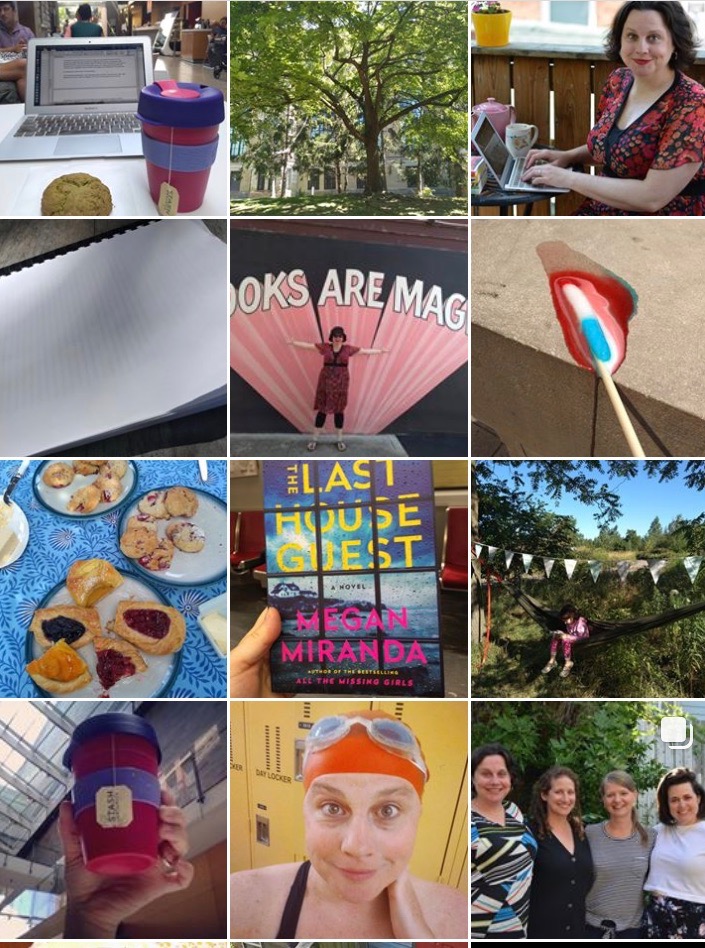
I’m really terrible at Instagram. Or rather, I’m totally amazing at Instagram, were Instagram a blog circa 2004. I share too much; cannot hold back; it’s sometimes poorly lit and totally unfiltered—well, except the photos of me in the yellow locker room first thing in the morning, which are what filters were made for, aesthetics are not central to the experience, the colours clash, and my face is everywhere. You either like it, or you don’t.
But I love it. For me, my Instagram is an extension of my blog for sure, the place where my most mundane and curious content has migrated. It’s a scrapbook of my days, my moments, and it’s also got the community component that blogs had circa 2004, people I’ve never met who feel like my friends. And there are certainly things I’ve posted on Instagram that have turned into actual blog posts, but just extended. Sometimes Instagram is where the thought begins.
It’s the immediacy of Instagram (and blogging) that I love, the Insta-ness. It’s the insta that makes the whole project worthwhile. Although there is actually very little that’s insta about Instagram anymore, now that the feed is algorithmic instead of chronological, and we’re all supposed to schedule our posts for optimum brand engagement. But I refuse to be a brand, and keep on insisting on being an actual, real live and moderately-flawed human being. Not for everyone—and that’s okay.
How can you even schedule a blog post, or an instagram post? For me, blogging has always been about the moment, capturing the atoms as they fall (to paraphrase Virginia Woolf). Right now as I’m scrambling to write this down with twenty minutes to spare before we tumble out the door and onto the subway to meet friends for a picnic. Context is everything, and so is (I suppose) exuberance, which is what leads me to post nine photos in a row in a single afternoon, an effort to (impossibly) capture every single angle.
This green, this light. How it was exactly. (And now it’s gone. But not entirely.)
August 12, 2019
Crime Fiction Round-Up
One Small Sacrifice, by Hilary Davidson
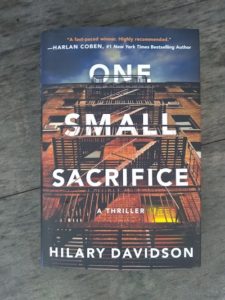
It took a bit of time for Hilary Davidson’s latest to grow on me, mostly because the novel begins after a lot of the story has already taken place. War photographer Alex Traynor escaped conviction after the death of his friend a year before, but Detective Sheryn Sterling has had her eye on him—and when his fiancee goes missing, Sterling is desperate to find her and finally get this dangerous character off the streets where he belongs. But of course, the reality of the situation turns out not so straightforward after all, as sections of the book from the point of view of Alex and his fiancee make clear. Even more difficult, Alex suffers from the effects of PTSD and isn’t entirely sure he can trust himself after suffering from blackouts. But once the novel got going, I was totally hooked, and there were plenty of twists I never saw coming. New York City also makes for a spectacular setting (that cover, right?) and Davidson evokes it so well. I really loved this one.
*
A Dance of Cranes, by Steve Burrows
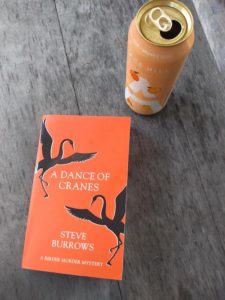
Can you believe I’ve been reading the Birder Murder mystery series for six books now? Never a disappointment, even if sometimes plot lines strain for credulity. (Shocking for a birdwatching detective series, right??) But I continue to adore these books, this one which starts off with Inspector Domenic Jejeune back in Canada and split with his partner Lindy (for her safety, of course, though he doesn’t bother to tell her about that) but now Domenic’s brother has gone missing in a vast and remote park in Canada’s north (obviously, there are whooping cranes involved) and it’s up to Domenic to rescue him, risking his life in the process. All the while back in England, Lindy’s life continues to be in danger, but not for the reason everybody thinks it is (and obviously, there are cranes involved, though not necessarily whooping) and will romance finally blossom between Detectives Lauren Salter and Danny Maik? A fabulous instalment in a series that is reliably delightful.
*
A Better Man, by Louise Penny
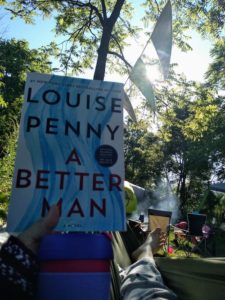
And speaking of reliable, the latest Inspector Gamache novel is a summer highlight for me every year, even through credulity often suffers the same straining. But reading Louise Penny while camping is my favourite thing, and I’ve been doing it for years now, for so long that I no longer believe that Gamache carries the scent of sandalwood, as the narrative asserts, but instead: he smells like campfire smoke. A Better Man stays close to Three Pines—rivers are raging and spring floods are high, putting the province of Quebec in peril. And then a woman goes missing, and her abusive husband just might get away with the crime. Gamache has returned to Head of Homicide after a demotion and is serving with his son-in-law, Jean-Guy, for one more case before Jean-Guy and family begin a new life in Paris. The personal and professional remain interwoven in this story, which was everything I look for in a Louise Penny novel. Reading it is truly a pleasure.
